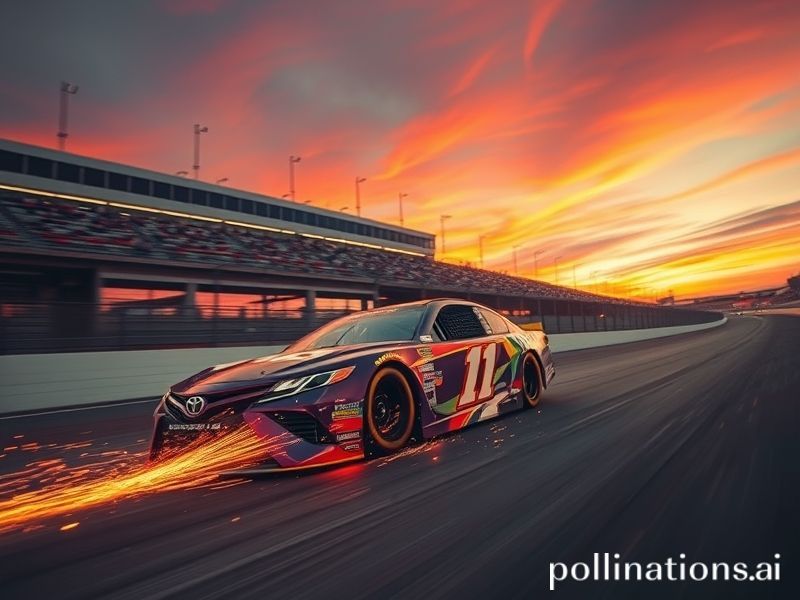Denny Hamlin: The Last American Export Still Running on Leaded Nostalgia and Global Irony
Denny Hamlin Is the Last American Export That Still Runs on Leaded Nostalgia
By Dave’s Locker Global Affairs Desk
PARIS—On any given Sunday, while half the planet doom-scrolls through tariff wars and the other half wonders whether Brussels will ration olive oil, somewhere in the Carolinas a man in a fireproof onesie mashes a throttle and becomes a temporary export commodity. Denny Hamlin, 43, NASCAR lifer and reluctant geopolitical metaphor, is currently the United States’ most reliable overseas shipment that isn’t a microchip embargo or a Netflix true-crime doc.
To the uninitiated, Hamlin is merely another stock-car chauffeur with a podcast and a tax attorney on speed dial. To the global audience that tunes in for crashes, cultural anthropology, or sheer insomnia, he is something more unsettling: a living fossil of peak-oil exuberance on wheels, still sponsored by a pizza chain that no European cardiologist will publicly admit to tasting.
Consider the international ledger. The No. 11 Toyota Camry—an American sedan built in Indiana, powered by Japanese engineering, wearing a paint scheme hawked by a Brazilian energy-drink concern—circles oval tracks from Fontana to Fort Worth like a restless aircraft carrier that never learned to turn right. Each lap is a miniature balance-of-payments statement: U.S. viewership up, European ratings nonexistent, Middle Eastern petrodollars laundered through sponsorship decals no one reads at 200 mph.
Hamlin himself knows the drill. In 2008 he flew to Motegi, Japan, to race in a wet exhibition that felt like staging kabuki at a demolition derby. The stands were half-empty, the translators exhausted, and the jet-lagged drivers hallucinated Mount Fuji in every infield tire bundle. It was globalization on four bald Goodyears. “They served us sushi in the garage,” Hamlin later told reporters, his voice the audible shrug of a man who grew up on gas-station roller dogs. “I thought the wasabi was guacamole. Nearly lost a sinus.”
Fast-forward to 2024. NASCAR’s latest attempt at world domination is a street race in Chicago, an idea cooked up by the same consultants who believe that putting mayonnaise on sushi counts as fusion cuisine. Hamlin, ever the pragmatist, has already hedged: he co-owns 23XI Racing with Michael Jordan, a brand synergy so baldly commercial it could be taught in Davos as a cautionary tale. Their merch ships to 37 countries, most of which couldn’t locate Daytona on a map even if you spotted them Florida.
Meanwhile, Formula 1—NASCAR’s cosmopolitan cousin who studied abroad and won’t shut up about it—has colonized Netflix, TikTok, and apparently the entire population of the Netherlands. Liberty Media, F1’s American overlords, now stages races in Saudi Arabia, Qatar, and soon Las Vegas, because nothing says “sporting purity” like a slot-machine backdrop and a government that occasionally dismembers journalists. Hamlin’s response? A laconic tweet: “At least our track doesn’t have a mall in Turn 3.” The ratio was brutal; the point, unassailable.
The broader significance, if one insists on finding meaning in a sport that burns 110-octane existential dread, is that Hamlin represents the last gasp of unabashed American exceptionalism that isn’t trying to sell you crypto. While Silicon Valley promises salvation through software updates and European regulators debate whether to ban kettles, Hamlin still believes the solution to most problems is more horsepower and a later caution flag. It’s a worldview as outdated as leaded fuel, yet curiously resilient—rather like the American voter.
And so the planet spins, TikTok teens in Jakarta lip-sync to engine noise, and Denny Hamlin keeps turning left, a red-white-and-blue metronome counting down the miles until the last drop of high-octane denial is gone. Should you find yourself abroad, jet-lagged in a hotel whose minibar charges extra for existential clarity, flip to whatever channel still shows stock cars. There he’ll be, visor up, grinning like a man who knows the bill is coming due but figures someone else is picking up the tab.
In the end, we’re all just passengers, strapped in for the ride, praying for a caution lap that never comes.







